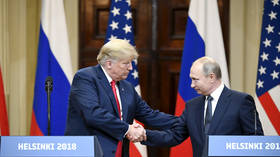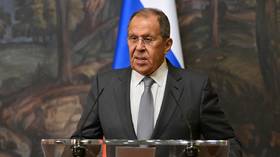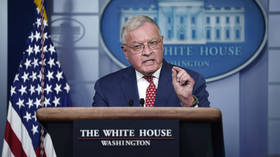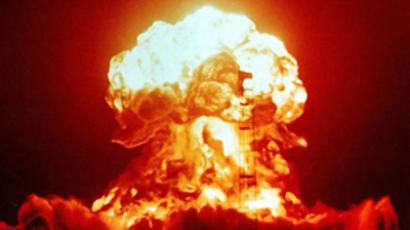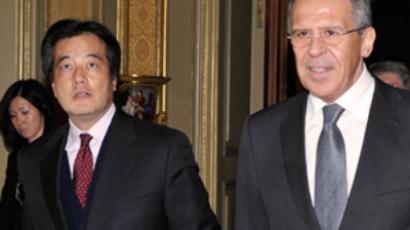Arctic race to stake a claim already in full swing
Scientists and politicians from around the world are in Moscow to break the ice over the Arctic. They have gathered for an international conference on the future the rich natural resources under the Arctic Ocean.
The International Arctic Forum in Moscow has brought politicians and scientists to the bargaining table.
It is all mainly about what lies beneath the polar ice – vast amounts of untapped natural resources.
The Arctic has incredible energy potential and the five powers sharing the Arctic – Russia, Canada, Denmark, Norway and the US – are hunting for the lion's share of this region's seabed deposits and make territorial claims on it. Many others are very interested to see how the division of the territory will take place and how the extraction of hydrocarbons will be achieved.
With experts estimating the polar treasure chest could hold a quarter of the world's oil and gas reserves, the debate over who gets what was never going to be easy.
Artur Chilingarov, President Dmitry Medvedev's commissioner for international co-operation in the Arctic and the Antarctic explained, “It's called ‘The Arctic – territory of dialogue’. All the disputes could be resolved through dialogue. And the best basis for more productive dialogue is scientific research.”
Just a week ago, Russia and Norway demonstrated the power of dialogue. The two signed an agreement bringing an end to a four decades long dispute over a potentially energy-rich area in the Barents Sea.
Another frozen wrangle, between Russia and Canada, over the Lomonosov Ridge, which both countries claim belongs to them, is also showing signs of melting away: the neighbors have agreed to settle the feud based on the UN convention on the Law of the Sea.
“Those who say there will be a conflict of interest in relation to the claims are unaware of the situation. We see here the topic uniting our countries rather than a dividing force,” says top Russian representative at the International Arctic council Anton Vasiliev, Russia's Ministry of Foreign Affairs ambassador at large. “We are co-operating with Canada and we are exploring the seabed, and that's good for both of us and for the whole region.”
A place for dialogue
The Arctic race started deep in the ocean. In 2007 Russian explorers plunged to the very bottom of the North Pole, the first expedition of its kind. They planted a titanium Russian flag on the seabed, at a depth of more than 4,000 meters.
Since then the Arctic states have launched numerous expeditions to help prove their Polar territorial claims.
The International Arctic forum will bring to the surface the hottest issues surrounding one of the coldest regions. It is too early to say now whether this gathering will be able to bring down temperatures in relations between the five Arctic states, but at least one goal will certainly be achieved. What has recently been a region dogged by a scramble for resources and territorial claims will become a place for dialogue, at least for a while.
Dr. Lawrence C. Smith, ecology professor with UCLA, told RT that he is impressed that Arctic states are working as much on the ecology of the region’s development as they are on the legal aspects of their claims. The procedure is complicated by the fact that each of the five nations has its own environmental laws, but within them the protection of nature continues to be a matter of great importance, the professor said.
Morten Anker, an analyst on Russian economics and politics for a Norwegian engineering consultancy, said in an interview with RT that people should not take for granted all claims about the great mineral resources in the Arctic. He also said that huge production and transportation costs make these resources useless for the economy. However, Anker noted that it was good that Arctic nations, such as Russia and Norway, are paying attention to territorial divisions and reaching agreements in this sphere. On the other hand, Mr. Anker noted that the pact between Russia and Norway does not indicate that there will be no more territorial conflicts in the Arctic.
The President of Iceland Olafur Ragnar Grimsson says Moscow is playing a key role in settling the Arctic dispute by deciding to host the International Forum.
He said “The most important thing about this is the idea of a dialogue which [has been] tabled by Russia for almost a year.”
“The working dialogue is in the idea that we work together, we take common solutions,” he noted.
The rector of the University of Lapland, who is attending the conference, believes the region's spoils should be shared, but Russia's geographical position means it deserves a bigger slice of the pie.
“It was a 19th Century idea and it was easy to have some kind of map plans saying this area belongs to one country and another area belongs to some other country,” M. Ila-Kotola, rector of the University of Lapland said, adding that Arctic should be a common area.
“Of course, certain countries have more rights to work there, but it should be country of the Arctic people living in Canada, Alaska and Russia.”
According to Arild Moe, senior research fellow from the Fridtjof Nansen Institute of Norway, there is no certainty about the amount of natural resources hidden under the Arctic ice.
“There is already today a certainty that there are some regions in the Arctic like the Russian part of the Barents Sea, the Kara Sea, the Beaufort Sea and some other regions where there are significant concentrations of petroleum resources. But the overall assessments of the Arctic resource potential is very weak. In a sense there are big uncertainties and a lot more exploration must be done,” he said.
“It has to be remembered that the numbers that are frequently cited, for instance from the United States’ Geological Survey, do not take into account commercial considerations which are cost issues and special technological requirements. So I think the impression might be somewhat exaggerated, but certainly it is an important region,” Moe added.
The fragile environment of the Arctic
According to a senior adviser for the Research Council of Norway, Olav Orheim, there are objective problems which need to be addressed before going for the Arctic riches.
“One of problems in this connection is that the Arctic is under-researched,” he said. “We know less about the Arctic than we do about most of the world and so we do not actually know whether all parts of ecosystem – or for that matter with the fisheries – how much they will be affected by resources protection.”
”This we need to know,” Orheim added. “Of course, we need to be able to predict how climate will change in the future and what will happen then with the snow and the ice in the Arctic.”
The ice in the Arctic is melting, making it easier to extract the vast deposits under the cold sea, however the world should not forget about the fragile environment of the Arctic, agrees Lars Moller, Chair of the Senior Arctic Officials, Arctic Council.
“We need sustainable development [of the Arctic] based on an ecological basis. This is the essence of the work going on in the Arctic countries. This is what we are trying to do – all kinds of reports about the Arctic its peoples, including its indigenous peoples, and recourses, trying to balance the various things that should be balanced, at one and the same time development and taking care of the environment,” Moller concluded.
In an interview with RT, Arctic expert Nikita Ovsyannikov said that urgent measures must be taken to save the arctic’s nature, which has been heavily damaged both by quickening global warming and by unwise exploration by humans in past years. If no political will is shown as soon as possible, such species as polar bear could become extinct in the near future, the scientist says.
According to Professor Paul Arthur Berkman of the University of Cambridge, it may be possible to preserve the fragile Arctic ecosystem along with getting to its resources.
”One of the inspirations of the ingenuity of humankind is that if we can think it we can build it, so part of the strategy that we are identifying is a need to have resource development in an environmentally non-damaging manner. How this matures is a question that technologies will help to address.”
He observed, though, that currently there are other issues that need to be addressed urgently.
“In the long term as well as in the short term, issues of stability in the region will allow the opportunities to mature so those must be first and foremost on the minds of all involved,” Berkman said.


